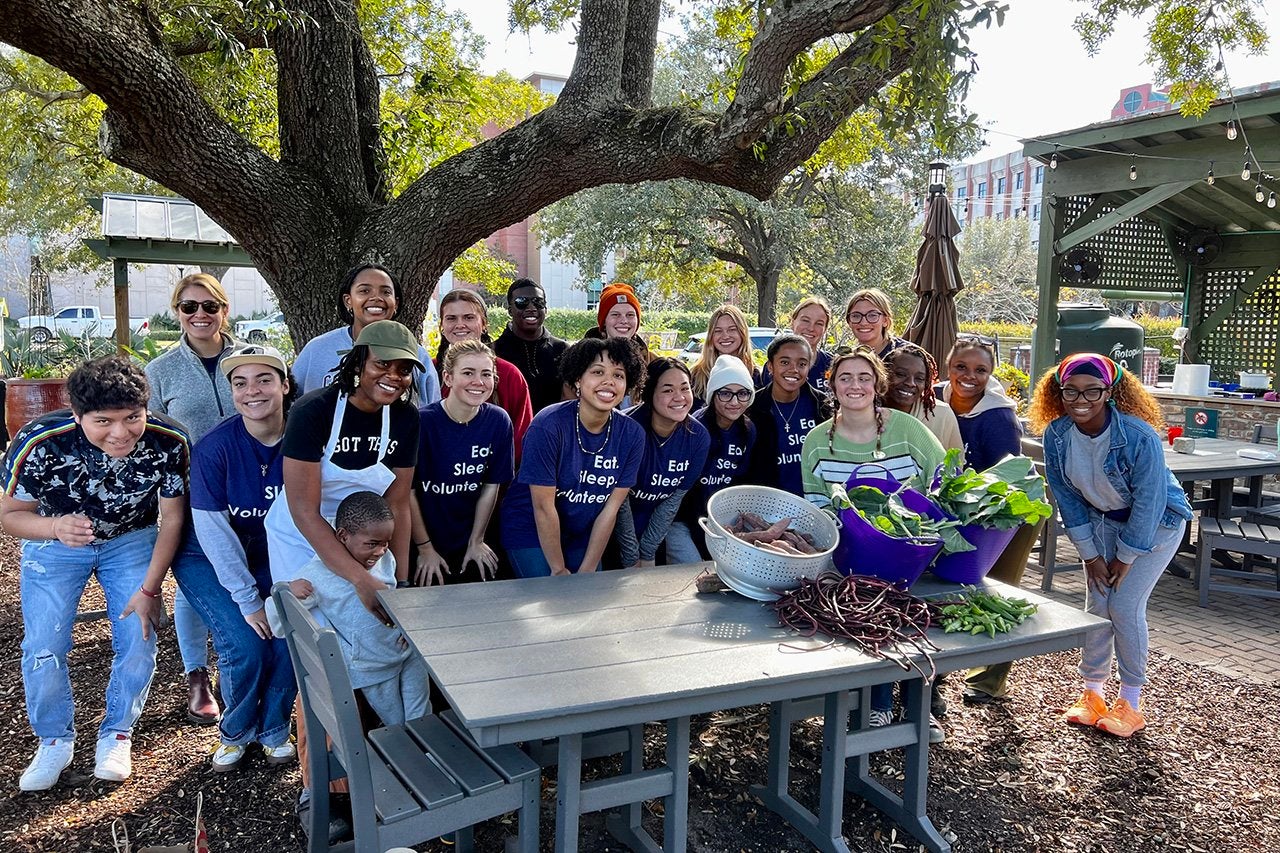Above: Alani Boyd (front row, center, wearing a necklace) at the MUSC Urban Garden with her fellow Bonner Leaders, Chef Takeya Meggett and son (front row, third from left), and Laura Fornadel (back row, far left).
Food has a way of connecting us. It brings us together, builds relationships and teaches us about different cultures and histories. And – although chef James Beard probably wasn’t thinking of land preservation, climate change and agriculture when he said, “Food is our common ground” – it also connects us to the land that feeds us.
For sophomore Alani Boyd, a College of Charleston Bonner Leader and student in the Honors College, it all goes hand in hand – especially when it comes to preserving the Lowcountry’s Gullah Geechee culture, history and land. That’s why she designed and organized a “Service Saturday” experience last month highlighting land preservation efforts, climate change and agriculture to help her fellow Bonner Leaders connect with Gullah history, culture and cuisine.
“Organizing this event was important for me. I’ve been really interested in the Gullah culture, as so many aspects have historical and cultural influence on our lives today,” says Boyd, an international studies and political science double major. “My interest in the Gullah culture and the social issues surrounding its cultural preservation was sparked by my want to connect with individuals on the basis of history that has been influencing and impacting us for years.”
Boyd coordinated the daylong event as part of her responsibilities as a member of the College’s Bonner Leader Program, a four-year civic leadership and development program in which students work with local community partners and nonprofits to volunteer approximately 300 hours per academic year.
“For this Service Saturday, the emphasis on connection to the land was a big part of the direct service,” she says, adding that she wanted to give Bonners the opportunity “to directly interact with the land on a physical aspect, while learning the importance of agricultural integrity and land preservation – a current issue that is threatening the Gullah culture today.”
The Bonner Leaders meet weekly to discuss important social justice issues with a focus on how they can personally impact the community. The College of Charleston is one of just 65 colleges and universities in the United States to offer the Bonner Leader Program. The national program is an initiative of the CofC Center for Civic Engagement (CCE).
“At the CCE, we help students understand the connection between education, service and reflection,” says Laura Fornadel, associate director of the CCE and director of the Bonner Leader Program. “Alani brought these three points to life to help spark students’ interest in the region’s Gullah Geechee culture. Her work and the Bonners’ participation in Service Saturday are a great representation of our mission.”
Nearly two dozen Bonner Leaders participated in the Service Saturday on Nov. 19, 2022, immersing themselves in Gullah history, culture, agriculture and culinary traditions. Held at the Medical University of South Carolina Urban Farm in downtown Charleston, the event blended in-depth learning about social justice issues with direct service to support community partners involved in mitigating these issues, focusing on three key components:
- Cultural and historical Gullah education, especially through land, food and agriculture, with Boyd leading the instruction to her peers, emphasizing current issues surrounding cultural and physical land preservation.
- Service at MUSC Urban Farm, including planting and harvesting crops that are vital to the Gullah culinary customs, and creating information cards about the cultural significance of the ingredients. Some herbs and vegetables from the site were used to prepare a meal for the group, and the majority of portions donated to South Carolina’s first and only pay-what-you-can café, Destiny Community Café in North Charleston. The planting and seeding will support the farm’s spring harvest.
- Interactive Gullah-inspired meal preparation, cooking and reflection with Takeya Meggett, an area chef with celebrated Gullah roots and specialization in the cuisine, who emphasized the historical and cultural significance of each ingredient as it relates to the efforts of ancestral legacy and cultural preservation today.
“It’s so important for Bonners to interact with the land and knowledgeable partners like Takeya to truly put the cultural essence into perspective,” says Boyd. “I wanted to accurately reflect a community that has been impacting us for so long, not only on a cultural basis, but also regarding current issues that surround the land and its cultural preservation.”
Ultimately, Boyd wants the experience to have an impact on future generations: “Hopefully it’ll start more of an effort to help keep the integrity of the land and preserve it, not only for the ancestors of the Gullah community but for the future of agriculture in general.”
After all, having those connections to the history, culture and people in our community is what puts us all on solid ground, feeding us for years to come.




